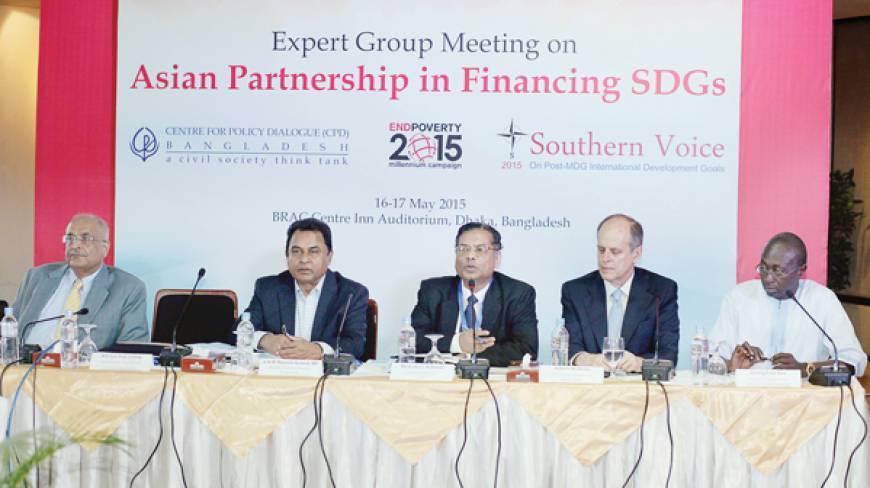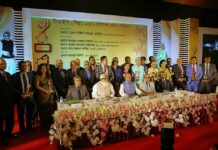Domestic resource mobilisation is the anchor of financing the post-2015 agenda, also known as sustainable development goals (SDGs), local and foreign experts said yesterday.
Apart from this, factors include ODA (Official Development Assistance), intra-regional trade, aid for trade, duty-free and quota-free access are also important for achieving SDGs by 2030 set by the United Nations.
The suggestions were made in the opening session of Expert Group Meeting (EGM) on Asian Partnership in Financing SDGs organised by the Centre for Policy Dialogue (CPD), Southern Voice, in partnership with the UN Millennium Campaign in the city yesterday.
The EGM explored possible sources of finance and other means of implementing SDGs in the Asian context to prepare an integrated report to be presented at the international conference on Financing for Development in Addis Ababa scheduled for sometime in July this year.
CPD Executive Director Professor Mustafizur Rahman moderated the event while a galaxy of experts both from local and foreign countries spoke.
Speaking as the chief guest, Planning Minister Mustafa Kamal agreed on the necessity of domestic resource mobilisation for financing implementation of SDGs, saying: “We have to have some reforms in taxations to increase tax to GDP ratio. The loopholes in this should be plugged properly.”
Urging developed countries to withdraw restrictions on people’s movement from country to country and exportable goods, he said. “In order to help achieve SDGs, Bangladesh should allow its manpower and its products to be exported without any restrictions so that we can use our own resources at maximum level,” he said.
Dramatic transformation has taken place in the world’s landscape on humanity when there were no restrictions on people movement from one country to another over the last 200 years, he said.
“Taking advantage of this, America, Singapore and Malaysia were built. But now many countries even America put restrictions on people movement and goods, holding back prosperity of economic growth of developing countries.”
Describing the country’s impressive economic growth and other social indicators over the years, he said now Bangladesh’s target is to bring down poverty below 9% from the existing 24% and extreme poverty to 7% from 18% by 2021.
“By 2030, the country will be absolutely free form hunger as healthy macroeconomic factors are the signs of that.”
Executive Director of BRAC Institute of Governance and Development (BIGD) Sultan Hafeez Rahman said ODI is falling because developed countries are not in position to support due to economic recession.
Putting emphasis on domestic private investment and FDI for financing development, he said contexts in developing countries have changed and it is much harder to make them accept things they do not necessarily find relevant to their interests.
UN Residential Coordinator Robert Watkins said the world is going to prepare for the next phase of development agenda for sustainable developments.
“What we saw in MDGs is completely absent such as governance and job growth.”
He termed BCIM initiative innovative concept for regional benefit, saying that Bangladesh’s growth largely depends on remittance, RMG and agriculture, which together constitute largest share of the country’s GDP.
Robert added that remittance is relied on other countries and RMG on low-skilled workforce, and agriculture employs 45% of labour force.
But this not sustainable for long term, he warned.
“I fear that Bangladesh is in development danger to benefit the rich and the poor are left behind that suggests that economic growth is actually two sides of same coin. Economic growth with equality is the core development agenda of the past and for the SDGs. This should be addressed,” he said.
Korean Ambassador to Dhaka, Lee Yun-young, described Korea’s experience on how the country transformed itself from a foreign aid recipient country to a donor country within the past half century.
Right after Korean war in 1961, he said, Korea received more than $2m foreign aid and economic growth remained stagnant at 3.6% on an average during the period.
Then, the Korean government felt the necessity of mobilisation of domestic resources and took an institutional reforms to establish national tax service and introduce VAT system, he said.
Source: Dhaka Tribune










